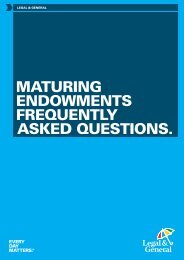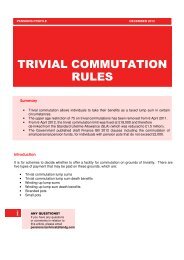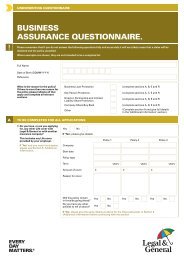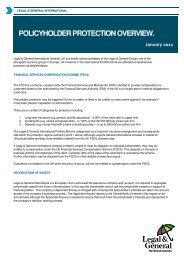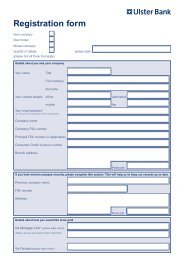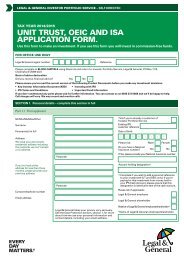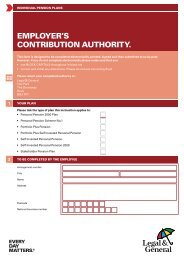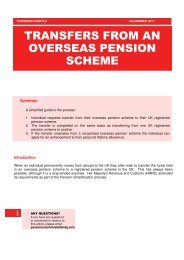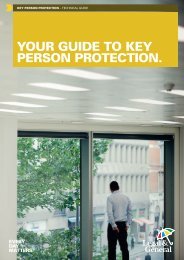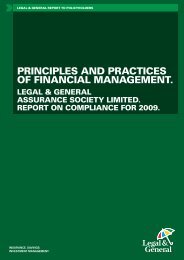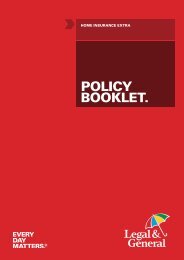CIC vs IPB Comparison Guide (W13135) - Legal & General
CIC vs IPB Comparison Guide (W13135) - Legal & General
CIC vs IPB Comparison Guide (W13135) - Legal & General
Create successful ePaper yourself
Turn your PDF publications into a flip-book with our unique Google optimized e-Paper software.
CRITICAL ILLNESS COVERINCOME PROTECTION BENEFITQUALITYOF LIFE.Our Critical Illness Cover Plans andIncome Protection Benefit can helpprotect and help maintain the qualityof life that you’re accustomed to.But which cover is right for you?This guide can help you decide.
2CRITICAL ILLNESS COVER AND INCOME PROTECTION BENEFITCOMPREHENSIVECOVER.Our Critical Illness Cover Plans and Income ProtectionBenefit can work very well together as a way of helpingto protect you and your family’s quality of life if everyou were diagnosed with a critical illness or wereinjured and unable to work for a period of time.
CRITICAL ILLNESS COVER AND INCOME PROTECTION BENEFIT3CRITICAL ILLNESS COVERINCOME PROTECTION BENEFITAims to pay a tax-free one-off lumpsum or a monthly benefit, dependingon plan chosen, if you are diagnosedwith a critical illness, or if you dieduring the length of the plan. It alsopays out if you are terminally ill andmeet our definition, except in the last12 months of the plan.Aims to provide a regular tax-freemonthly benefit if you are unable towork due to incapacity, caused byillness or injury, that results in a lossof earnings during the length of theplan.Provides cover for illnesses suchas cancer*, heart attack, MultipleSclerosis (MS) and stroke.Provides cover for conditions suchas severe back pain and mental illnessthat prevent you from working for aperiod of time.Critical Illness Cover is designed tohelp cover your financial commitmentsleaving you to focus on your health.For example, a lump sum could helpto pay off your mortgage, help modifyyour home, or help pay for privatetreatment.Income Protection Benefit isdesigned to help pay for your monthlyexpenses, such as mortgage andhousehold bills, medical billsor general living expenses.We don’t put a time limit on whenyou can claim which means you canclaim when the time is right for you.If you become incapacitated, therewill be an initial period of time whenwe don’t pay any benefit, which we callthe deferred period. You can chooseeither a 4, 13, 26 or 52 week deferredperiod when you take out the policy.In the event of a successful claim for acritical illness, your cover will end.If you return to work after a claim,the cover will continue until thepolicy ends or you die, whichevercomes first.*Please note, not all types of cancer are covered under our Critical Illness Cover Plans.
CRITICAL ILLNESS COVER AND INCOME PROTECTION BENEFIT4WHY CONSIDER CRITICALILLNESS COVER?You may be interested to hear thatin 2012, the average age of our criticalillness claimants was just 48 years old.Here are some facts to consider:• Parkinson’s disease affects10,000 new people in the UKeach year, with one in 20 peoplediagnosed before they are40 years old.• Each year, around 150,000 people inthe UK have a stroke, and a quarterof those people are under age 65.• Multiple Sclerosis (MS) affectsaround 100,000 people in the UK.MS is most often diagnosed inpeople in their 20s and 30s.• Around 1,200 women under 50 inthe UK die from breast cancereach year.*• Around 47% of all testicular cancercases occur in men under 35 yearsold, and over 90% of cases occurin men under 55 years old.*• Around one in 10 of all cancer casesare in adults aged 25-49 years old.*WHY CONSIDER INCOMEPROTECTION BENEFIT?Inability to work due to injury or illnesscan have a dramatic effect on yourearning potential. Could you affordto live without an income?• Each year over 300,000 people fallout of work onto health-relatedstate benefits.• It takes an average of 17 weeks forpeople claiming Employment andSupport Allowance to be assessedand then over 60% are actuallyfound fit for work.Joseph Rowntree Foundation carry outan annual survey to determine whatmembers of the public think peopleneed to achieve ‘a socially acceptablestandard of living’. The findings fromthe 2011 survey tell us:• A single person needs to earnat least £1,250 a month, and couplewith a single earner and two childrenneed at least £2,633.33 a month.• Out-of-work benefits remain wellbelow people’s requirement for aminimum standard of living.• Over the past three years, benefitlevels have decreased compared tothe amount of money required tomeet people’s minimum needs.Age restrictions apply to Critical Illness Cover Plans.
5CRITICAL ILLNESS COVER AND INCOME PROTECTION BENEFITWHAT ABOUT MYEMPLOYER ANDGOVERNMENT BENEFITS?Your employer and the government may be able to offersupport if you are injured, fall ill or contract a serious illness,but will it be enough?• Employers are legally obliged to support you for the first28 weeks that you are unable to work but they may not payyou your full salary and it could be as low as £86.70 a week.• If you are self-employed, you’ll probably have to fund yoursick pay yourself, which is an added strain on your finances.Would you be able to afford to pay yourself sick pay if youcouldn’t work?• The Government’s Employment and Support Allowance(ESA) for a single person is up to £71.70 a week during theAssessment Phase of an illness and up to £100.15 a weekduring the Main Phase.• The Disability Living Allowance’s Care Component pays up to£79.15 a week, and its Mobility Component pays up to £55.25.State benefits were correct as at April 2013, but are subjectto change.ASK YOUR ADVISERCould Critical Illness Cover and Income ProtectionBenefit work together for you?Please speak to your adviser who will be happy tohelp talk you through your options and the benefitsand limitations of the plans.
<strong>Legal</strong> & <strong>General</strong> Partnership Services LimitedRegistered in England and Wales No. 05045000.Authorised and regulated by the Financial Conduct Authority.<strong>Legal</strong> & <strong>General</strong> Assurance Society LimitedRegistered in England and Wales No. 00166055.Authorised by the Prudential Regulation Authority and regulated by theFinancial Conduct Authority and the Prudential Regulation Authority.We are members of the Association of British Insurers.Registered office for both firms: One Coleman Street, London EC2R 5AA<strong>W13135</strong> 01/14



